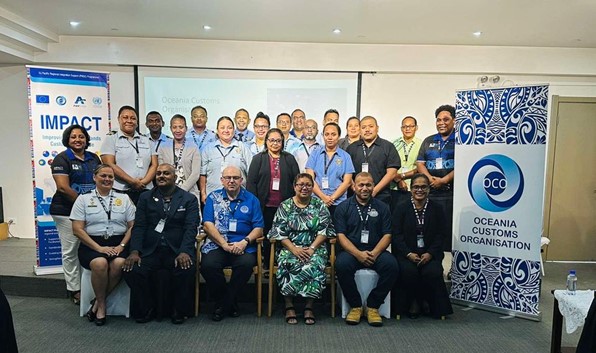
The Pacific region has established a new pool of training experts in customs and trade.
In February 2024, 16 customs and trade experts from across the Pacific Island Countries, graduated as trainers following the successful completion of the first Training of Trainer (ToT) Program.
The training was delivered in accordance with the Professional Standards Framework (OPSF) of the Oceania Customs Organization (OCO), which aims to deliver accredited customs training programs to members, quality assurance to the trainees and a pathway to obtaining academic qualifications. The Framework intends to professionalize and improve the proficiency of customs officers and support the harmonization and performance standards of customs in the region.
The cohort will be trained over the next few months on various topics related to customs and trade, with support from the European Union (EU) funded Improving Pacific Islands Customs and Trade (IMPACT) project implemented by the United Nations Conference on Trade and Development (UNCTAD).
The first training focused on key areas of the World Trade Organization’s Trade Facilitation Agreement (WTO TFA), the Revised Kyoto Convention (RKC), and the interim Economic Partnership Agreements (iEPA).
The trainers will build capacities of the customs administration through a more targeted approach. Accordingly, they are now delivering trainings to their customs colleagues.
The Vanuatu Customs and Inland Revenue, Acting Deputy Director for Inland Revenue, Mr. Nicholas Godden, says the delivery will help him sharpen his training delivery skills in the future.
Mr. Godden who has spent 30 years in customs, said, “I have been delivering trainings in past, however what I learnt this week will enhance my skills as a facilitator. I am confident to apply these skills in the upcoming training to build capacity of others in the customs.”
In highlighting the essence of the Framework, the Oceania Customs Organization, Head of Secretariat Nancy T. Oraka said, “The Framework represents a collective commitment to excellence, regional collaboration, and the preparation of our customs officials for the future.”
She added that the successful graduation of the cohorts was a clear indication of the value and necessity of such programs. “We are not only equipping our officers with the knowledge and skills they need but fostering leadership that will drive our customs administrations forward.”
The Trade Facilitation and Customs Expert at UNCTAD, Mr. Tevita Tupou said the increasing complexity of international trade and the surge in travel volumes called for a revolutionary approach to border management.
“The ongoing collaboration between the OCO, the Centre for Customs and Excise Studies (CCES), UNCTAD, and the EU is a testament to our commitment to pushing boundaries. Together, we are challenging the status quo in capacity building and modernisation programs, aiming to elevate our standards and services. This partnership is the catalyst for a culture of continuous improvement that we are proud to champion,” Mr. Tupou stated.
Mr. Tupou added that customs agencies must develop and implement long-term strategies that were built to embrace and drive change. In today’s competitive environment, Mr. Tupou pointed out that trade and investment naturally gravitated toward the most efficient, supportive, and facilitative regions.
ENDS